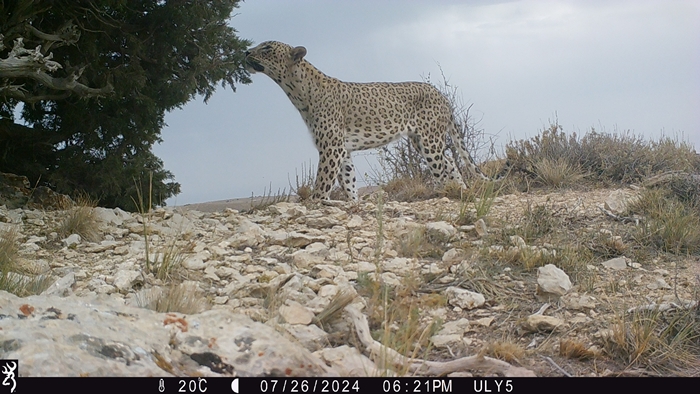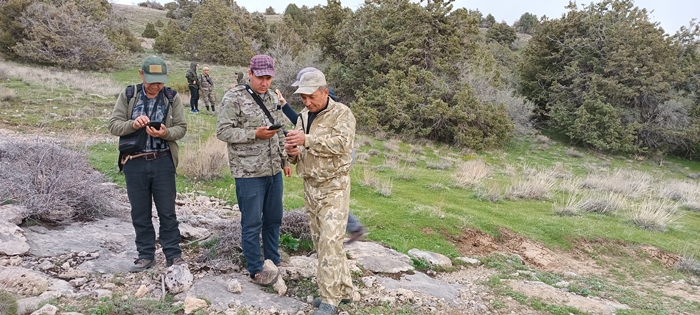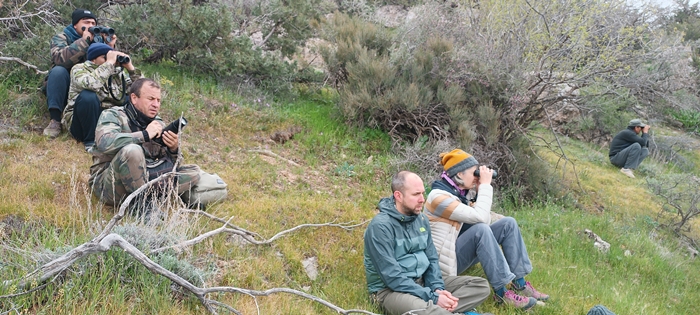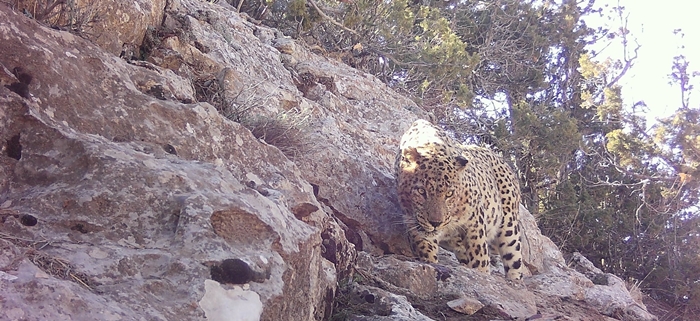Karryeva Sh.B., independent expert, project manager of the Center for Conservation of Large Landscapes ( CLLC) and Conservation X Lab
On July 1, 2024, a meeting was held at the Ministry of Environmental Protection of Turkmenistan (MEPT) between Dr. Tatyana Rosen, Director of the Central Asian Program of the international organization Conservation X Labs (CXL, USA), an expert of the International Union for Conservation of Nature (IUCN) on wild cats, with the leadership and representatives of the Ministry and national experts of the CEPF/CLLC project.
The meeting discussed cooperation issues within the framework of the 2nd phase of the project “Strengthening Transboundary Cooperation in the Kugitang Mountains: Connectivity, Potential and Cats”, implemented within the framework of the Memorandum of Understanding concluded between the Ministry and the Center for Large Landscape Conservation (“CLLC”). The second phase of the project is also implemented with funding from the Critical Ecosystem Partnership Fund (CEPF). The goal of the project is to promote the conservation of the biological diversity of the Kugitang Mountain Range, strengthen the scientific and technical potential of the reserve, improve conservation measures using new advanced SMART electronic technologies in line with the advancement of the digital economy in the country. International environmental experts provide support in conducting joint seasonal censuses of ungulates and other representatives of wild fauna, as well as in the preparation of the transnational nomination dossier “Koytendag Mountain Ecosystem” for re-submission to the UNESCO World Heritage Committee through cooperation with the Surkhan State Nature Reserve of Uzbekistan.
It was noted at the meeting that the inspectors of the Koytendag Reserve carry out regular SMART monitoring/inspection of territories; all data is processed, analyzed and transferred to the Ministry for taking appropriate measures to combat violators of environmental legislation. SMART is a spatial monitoring and reporting tool, it was first used by the employees of the Koytendag Reserve in 2022 and is being successfully implemented in other environmental institutions in the country.
The implementation of the regional Central Asian Key Cat Corridors Program, launched in Kazakhstan, Kyrgyzstan, and Turkmenistan, was also discussed. The program is based on supporting national conservation efforts for the snow leopard and Persian leopard in the Central Asian countries. The program, funded by Conservation X Labs and the National Geographic Society, includes joint research, monitoring, and action to conserve the Persian leopard and its prey (bezoar goat, urial) in the Balkhan Range and Ustyurt Plateau. CXL support has provided additional field equipment for the Balkan Velayat Environmental Protection Department and other national reserves. Data has been collected to confirm the leopard’s habitat in this mountain ecosystem.
The following species of wild cats live in Turkmenistan: the Persian leopard, lynx, manul, caracal, jungle cat, sand cat and steppe cat, many of which are “Red Book” and require special protection. They inhabit high mountain ranges, foothills and temperate deserts of our country, both in protected natural areas and beyond.
Thus, experts from Turkmenistan and other countries in the range of the Persian leopard developed a Regional Strategy for the Conservation of the Persian Leopard, which was officially adopted at the 14th Session of the Conference of the Parties to the Convention on the Conservation of Migratory Species of Wild Animals, which was held in Samarkand in February 2024. The Strategy provides exceptional opportunities to improve the conservation of the leopard by creating new protected areas, ecological corridors and implementing measures to reduce human-leopard conflicts throughout its range.
It was noted that the signing of a Memorandum of Understanding with the international organization CXL is currently in the process of being agreed upon. Conservation X Labs uses the latest technologies and innovations to find and develop solutions to eliminate the main drivers of extinction of wildlife species. CXL develops new solutions to improve the conservation of biodiversity by combining its own knowledge and experience in technology development, as well as partnerships with leading research institutions in the field of science, technology and engineering.
The Memorandum will further strengthen international cooperation to protect biodiversity, in particular to improve the protected status of the Persian leopard and other wild cats in Turkmenistan. In the future, CXL will also assist in identifying potential partners and donors to implement programs that meet the goals and objectives of both Parties to the Memorandum.
The meeting discussed the feasibility of Turkmenistan’s participation in the new CXL regional program “Securing Central Asian Wildlife Hotspots through Technology and Cross-Border Cooperation” aimed at protecting the Central Asian leopard and its prey. This program will start in the fall of 2024 and will allow for joint scientific monitoring, strengthen existing capacity and purchase additional equipment, which will strengthen the protection systems of the Balkan Velayat Environmental Protection Department and other reserves, as well as support efforts to establish a new Balkhan Reserve in Turkmenistan, the creation of which is included in the National Forest Program.
The staff of the Ministry of Environmental Protection of Turkmenistan, experts and scientists are faced with the big task of establishing a new nature reserve to protect this unique mountain ecosystem. This program will contribute to the restoration and conservation of the goitered gazelle, bezoar goat, urial, as well as the Persian leopard, which has been recorded on camera traps installed on the Ustyurt plateau in Kazakhstan, passing through the Balkhan-Garabogazgol-Ustyurt corridor. Protecting the corridor means helping to maintain ecological connectivity for leopards and their prey between Turkmenistan and Kazakhstan, which is one of the mandates of the Convention on the Conservation of Migratory Species of Wild Animals, which Turkmenistan joined on August 22, 2020.
In order to celebrate the International Ranger/Inspector Day, which is celebrated worldwide on July 31, as well as to stimulate the work of inspectors and attract public attention to environmental activities, during the meeting it was decided to solemnly celebrate this day in Turkmenistan and reward especially distinguished inspectors with valuable gifts. ///nCa, July 10, 2024



